- Home
- Thomas Pynchon
Against the Day
Against the Day Read online
The Penguin Press
New York
2012
THE PENGUIN PRESS
Published by the Penguin Group
Penguin Group (USA) Inc., 375 Hudson Street, New York, New York 10014, U.S.A.
Penguin Group (Canada), 90 Eglinton Avenue East, Suite 700, Toronto, Ontario, Canada M4P 2Y3 (a division of Pearson Penguin Canada Inc.)
Penguin Books Ltd, 80 Strand, London WC2R 0RL, England
Penguin Ireland, 25 St. Stephen’s Green, Dublin 2, Ireland (a division of Penguin Books Ltd)
Penguin Books Australia Ltd, 250 Camberwell Road, Camberwell, Victoria 3124, Australia (a division of Pearson Australia Group Pty Ltd)
Penguin Books India Pvt Ltd, 11 Community Centre, Panchsheel Park, New Delhi – 110 017, India
Penguin Group (NZ), 67 Apollo Drive, Rosedale, Auckland 0632, New Zealand (a division of Pearson New Zealand Ltd)
Penguin Books (South Africa) (Pty) Ltd, 24 Sturdee Avenue, Rosebank, Johannesburg 2196, South Africa
Penguin Books Ltd, Registered Offices:
80 Strand, London WC2R 0RL, England
This edition published in 2012 by The Penguin Press,
a member of Penguin Group (USA) Inc.
Copyright © Thomas Pynchon, 2006
All rights reserved
Originally published by The Penguin Press, 2006
Publisher’s Note
This is a work of fiction. Names, characters, places, and incidents either are the product of the author’s imagination or are used fictitiously, and any resemblance to actual persons, living or dead, business establishments, events, or locales is entirely coincidental.
ISBN 978-1-101-59466-7
No part of this book may be reproduced, scanned, or distributed in any printed or electronic form without permission. Please do not participate in or encourage piracy of copyrighted materials in violation of the author’s rights. Purchase only authorized editions.
Contents
One
The Light Over the Ranges
Two
Iceland Spar
Three
Bilocations
Four
Against the Day
Five
Rue du Départ
It’s always night, or we wouldn’t need light.
—THELONIOUS MONK
One
The Light
Over the Ranges
Now single up all lines!”
“Cheerly now . . . handsomely . . . very well! Prepare to cast her off!”
“Windy City, here we come!”
“Hurrah! Up we go!”
It was amid such lively exclamation that the hydrogen skyship Inconvenience, its gondola draped with patriotic bunting, carrying a five-lad crew belonging to that celebrated aeronautics club known as the Chums of Chance, ascended briskly into the morning, and soon caught the southerly wind.
When the ship reached cruising altitude, those features left behind on the ground having now dwindled to all but microscopic size, Randolph St. Cosmo, the ship commander, announced, “Now secure the Special Sky Detail,” and the boys, each dressed neatly in the summer uniform of red-and-white-striped blazer and trousers of sky blue, spiritedly complied.
They were bound this day for the city of Chicago, and the World’s Columbian Exposition recently opened there. Since their orders had come through, the “scuttlebutt” among the excited and curious crew had been of little besides the fabled “White City,” its great Ferris wheel, alabaster temples of commerce and industry, sparkling lagoons, and the thousand more such wonders, of both a scientific and an artistic nature, which awaited them there.
“Oh, boy!” cried Darby Suckling, as he leaned over the lifelines to watch the national heartland deeply swung in a whirling blur of green far below, his tow-colored locks streaming in the wind past the gondola like a banner to leeward. (Darby, as my faithful readers will remember, was the “baby” of the crew, and served as both factotum and mascotte, singing as well the difficult treble parts whenever these adolescent aeronauts found it impossible to contain song of some kind.) “I can’t hardly wait!” he exclaimed.
“For which you have just earned five more demerits!” advised a stern voice close to his ear, as he was abruptly seized from behind and lifted clear of the lifelines. “Or shall we say ten? How many times,” continued Lindsay Noseworth, second-in-command here and known for his impatience with all manifestations of the slack, “have you been warned, Suckling, against informality of speech?” With the deftness of long habit, he flipped Darby upside down, and held the flyweight lad dangling by the ankles out into empty space—“terra firma” by now being easily half a mile below—proceeding to lecture him on the many evils of looseness in one’s expression, not least among them being the ease with which it may lead to profanity, and worse. As all the while, however, Darby was screaming in terror, it is doubtful how many of the useful sentiments actually found their mark.
“Say, that is enough, Lindsay,” advised Randolph St. Cosmo. “The lad has work to do, and if you frighten him that way, he sure won’t be of much use.”
“All right, short-stuff, turn to,” muttered Lindsay, reluctantly setting the terrified Darby back on his feet. As Master-at-Arms, in charge of discipline aboard the ship, he went about his job with a humorless severity which might, to the impartial observer, easily have suggested a form of monomania. But considering the ease with which this high-spirited crew were apt to find pretexts for skylarking—resulting more than once in the sort of “close call” which causes aeronauts to freeze with horror—Randolph usually allowed his second-in-command to err on the side of vehemence.
From the far end of the gondola now came a prolonged crash, followed by an intemperate muttering that caused Randolph, as always, to frown and reach for his stomach. “I have only tripped over one of these picnic baskets,” called out Handyman Apprentice Miles Blundell, “the one all the crockery was in, ’s what it looks like. . . . I guess I did not see it, Professor.”
“Perhaps its familiarity,” Randolph suggested plaintively, “rendered it temporarily invisible to you.” His reproof, though approaching the caustic, was well founded, for Miles, while possessed of good intentions and the kindest heart in the little band, suffered at times from a confusion in his motor processes, often producing lively results, yet as frequently compromising the crew’s physical safety. As Miles now went about picking up pieces of the damaged porcelain, he evoked the mirth of one Chick Counterfly, the newest member of the crew, who was leaning against a stay, observing him.
“Ha, ha,” cried young Counterfly, “say, but if you ain’t the most slob-footed chap I ever seen! Ha, ha, ha!” An angry retort sprang to Miles’s lips, but he suppressed it, reminding himself that, as insult and provocation came naturally to the class from which the newcomer sprang, it was upon his unhealthy past that one must blame the lad’s habits of speech.
“Why don’t you give me some of that fancy silverware, Blundell?” young Counterfly now continued. “And when we get to Chicago we’ll find us a ‘hock shop’ a-and—”
“I recall to your attention,” replied Miles politely, “that all tableware bearing the Chums of Chance Insignia is Organizational property, to be kept aboard ship for use during official meal periods.”
“Like Sunday school around here,” muttered the picklesome youth.
At one end of the gondola, largely oblivious to the coming and going on deck, with his tail thumping expressively now and then against the planking, and his nose among the pages of a volume by Mr. Henry James, lay a dog of no particular breed, to all appearances absorbed by the text before him. Ever since the Chums, during a confidential assignment in Our Nation’s Capital (see The Chums of Chance and the Evil H
alfwit), had rescued Pugnax, then but a pup, from a furious encounter in the shadow of the Washington Monument between rival packs of the District’s wild dogs, it had been his habit to investigate the pages of whatever printed material should find its way on board Inconvenience, from theoretical treatments of the aeronautical arts to often less appropriate matter, such as the “dime novels”—though his preference seemed more for sentimental tales about his own species than those exhibiting extremes of human behavior, which he appeared to find a bit lurid. He had learned with the readiness peculiar to dogs how with the utmost delicacy to turn pages using nose or paws, and anyone observing him thus engaged could not help noting the changing expressions of his face, in particular the uncommonly articulate eyebrows, which contributed to an overall effect of interest, sympathy, and—the conclusion could scarce be avoided—comprehension.
An old aerostat hand by now, Pugnax had also learned, like the rest of the crew, to respond to “calls of nature” by proceeding to the downwind side of the gondola, resulting in surprises among the surface populations below, but not often enough, or even notably enough, for anyone to begin to try to record, much less coöUrdinate reports of, these lavatorial assaults from the sky. They entered rather the realm of folklore, superstition, or perhaps, if one does not mind stretching the definition, the religious.
Darby Suckling, having recovered from his recent atmospheric excursion, addressed the studious canine. “I say, Pugnax—what’s that you’re reading now, old fellow?”
“Rr Rff-rff Rr-rr-rff-rrf-rrf,” replied Pugnax without looking up, which Darby, having like the others in the crew got used to Pugnax’s voice—easier, really, than some of the regional American accents the boys heard in their travels—now interpreted as, “The Princess Casamassima.”
“Ah. Some sort of . . . Italian romance, I’ll bet?”
“Its subject,” he was promptly informed by the ever-alert Lindsay Noseworth, who had overheard the exchange, “is the inexorably rising tide of World Anarchism, to be found peculiarly rampant, in fact, at our current destination—a sinister affliction to which I pray we shall suffer no occasion for exposure more immediate than that to be experienced, as with Pugnax at this moment, safely within the fictional leaves of some book.” Placing upon the word “book” an emphasis whose level of contempt can be approached perhaps only by Executive Officers. Pugnax sniffed briefly in Lindsay’s direction, trying to detect that combination of olfactory “notes” he had grown accustomed to finding in other humans. But as always this scent eluded him. There might be an explanation, though he was not sure he should insist upon one. Explanations did not, as far as he could tell, appear to be anything dogs either sought or even were entitled to. Especially dogs who spent as much time as Pugnax did up here, in the sky, far above the inexhaustible complex of odors to be found on the surface of the planet below.
The wind, which till now had been steady on their starboard quarter, began to shift. As their orders had directed them to proceed to Chicago without delay, Randolph, after studying an aeronautical chart of the country below them, called out, “Now, Suckling—aloft with the anemometer—Blundell and Counterfly, stand by the Screw,” referring to an aerial-propulsion device, which the more scientific among my young readers may recall from the boys’ earlier adventures (The Chums of Chance at Krakatoa, The Chums of Chance Search for Atlantis), for augmenting the cruising speed of the Inconvenience—invented by their longtime friend Professor Heino Vanderjuice of New Haven, and powered by an ingenious turbine engine whose boiler was heated by burning surplus hydrogen gas taken from the envelope through special valve arrangements—though the invention had been predictably disparaged by Dr. Vanderjuice’s many rivals as no better than a perpetual-motion machine, in clear violation of thermodynamical law.
Miles, with his marginal gifts of coördination, and Chick, with a want of alacrity fully as perceptible, took their stations at the control-panels of the apparatus, as Darby Suckling, meantime, went scrambling up the ratlines and shrouds of the giant ellipsoidal envelope from which the gondola depended, to the very top, where the aery flux was uninterrupted, in order to read, from an anemometer of the Robinson’s type, accurate wind measurements, as an index of how rapidly the ship was proceeding, conveying these down to the bridge by means of a written note inside a tennis-ball lowered on a length of line. It will be recalled that this method of passing information had been adopted by the crew during their brief though inconclusive sojourn “south of the border,” where they had observed it among the low elements who dissipate their lives in placing wagers on the outcomes of pelota games. (For readers here making their first acquaintance with our band of young adventurers, it must be emphasized at once that—perhaps excepting the as yet insufficiently known Chick Counterfly—none would e’er have entered the morally poisonous atmosphere of the “frontón,” as such haunts are called down there, had it not been essential to the intelligence-gathering activities the Chums had contracted to render at that time to the Interior Ministry of President Porfirio Díaz. For details of their exploits, see The Chums of Chance in Old Mexico.)
Though the extreme hazard was obvious to all, Darby’s enthusiasm for the task at hand created, as ever, a magical cloak about his elfin form that seemed to protect him, though not from the sarcasm of Chick Counterfly, who now called after the ascending mascotte, “Hey! Suckling! Only a saphead would risk his life to see how fast the wind’s blowing!”
Hearing this, Lindsay Noseworth frowned in perplexity. Even allowing for his irregular history—a mother, so it was said, vanished when he was yet a babe—a father, disreputably adrift somewhere in the Old Confederacy—Counterfly’s propensity for gratuitous insult had begun to pose a threat to his probationary status with the Chums of Chance, if not, indeed, to group morale.
Two weeks previous, beside a black-water river of the Deep South, with the Chums attempting to negotiate a bitter and unresolved “piece of business” from the Rebellion of thirty years previous—one still not advisable to set upon one’s page—Chick had appeared one night at their encampment in a state of extreme fright, pursued by a band of night-riders in white robes and sinister pointed hoods, whom the boys recognized immediately as the dreaded “Ku Klux Klan.”
His story, as clearly as could be made out among the abrupt changes of register which typify the adolescent voice, exacerbated by the perilousness of the situation, was as follows. Chick’s father, Richard, commonly known as “Dick,” originally from the North, had for several years been active in the Old Confederacy trying his hand at a number of business projects, none of which, regrettably, had proven successful, and not a few of which, in fact, had obliged him, as the phrase went, to approach the gates of the Penitentiary. At length, upon the imminent arrival of a posse comitatus who had learned of his attempted scheme to sell the state of Mississippi to a mysterious Chinese consortium based in Tijuana, Mexico, “Dick” Counterfly had absquatulated swiftly into the night, leaving his son with only a pocketful of specie and the tender admonition, “Got to ‘scram,’ kid—write if you get work.” Since then Chick had lived from hand to mouth, until, at the town of Thick Bush, not far from the Chums’ encampment, someone, recognizing him as the son of a notorious and widely sought “carpetbagger,” had suggested an immediate application of tar and feathers to his person.
“Much as we might be inclined to offer our protection,” Lindsay had informed the agitated youth, “here upon the ground we are constrained by our Charter, which directs us never to interfere with legal customs of any locality down at which we may happen to have touched.”
“You ain’t from these parts,” replied Chick, somewhat sharply. “When they’re after a fellow, legal ain’t got nothing to do with it—it’s run, Yankee, run, and Katie bar the door.”
“In polite discourse,” Lindsay hastened to correct him, “‘isn’t’ is preferable to ‘ain’t.’”
“Noseworth, for mercy’s sake!” cried Randolph St. Cosmo, who had been glancing anxiously
out at the robed and hooded figures at the perimeter of the camp, the blazing torches they carried lighting each fold and wrinkle of their rude drapery with almost theatrical precision and casting weird shadows among the tupelo, cypress, and hickory. “There is nothing further to discuss—this fellow is to be granted asylum and, if he wishes, provisional membership in our Unit. There certainly remains to him no future down here.”
It had been a night of sleepless precaution lest sparks from the torches of the mob drift anywhere near the hydrogen-generating apparatus and devastation result. In time, however, the ominously cloaked rustics, perhaps in superstitious fear of that very machinery, had dispersed to their homes and haunts. And Chick Counterfly, for better or worse, had remained. . . .
The Screw device soon accelerated the ship to a speed which, added to that of the wind from directly astern, made it nearly invisible from the ground. “We’re doing a way better than a mile a minute,” remarked Chick Counterfly from the control-console, unable to eliminate from his voice a certain awe.
“That could put us in Chicago before nightfall,” reckoned Randolph St. Cosmo. “Feeling all right, Counterfly?”
“Crackerjack!” exclaimed Chick.
Like most “rookies” in the organization, Chick had found his initial difficulties to lie not so much with velocity as with altitude, and the changes in air-pressure and temperature that went along with it. The first few times aloft, he did his duty without complaint but one day was discovered unauthorizedly rummaging through a locker containing various items of arctic gear. When confronted by Lindsay Noseworth, the lad in his defense could only chatter, “C-c-cold!”
“Do not imagine,” Lindsay instructed, “that in coming aboard Inconvenience you have escaped into any realm of the counterfactual. There may not be mangrove swamps or lynch law up here, but we must nonetheless live with the constraints of the given world, notable among them the decrease of temperature with altitude. Eventually your sensitivities in that regard should moderate, and in the meantime”—tossing him a foul-weather cloak of black Japanese goatskin with C. OF C. PROPERTY stenciled in bright yellow on the back—“this is to be considered as a transitional garment only, until such time as you adapt to these altitudes and, if fortunate, learn the lessons of unpremeditated habitude among them.”

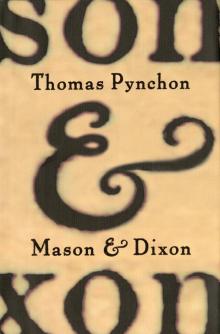 Mason & Dixon
Mason & Dixon Against the Day
Against the Day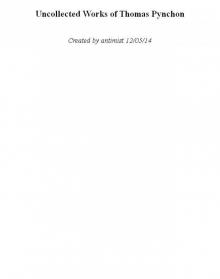 Uncollected Works
Uncollected Works Bleeding Edge
Bleeding Edge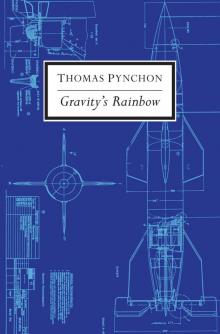 Gravity's Rainbow
Gravity's Rainbow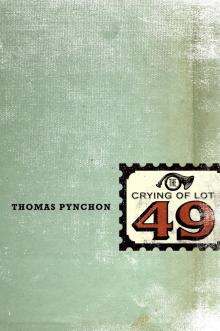 The Crying of Lot 49
The Crying of Lot 49 V.
V.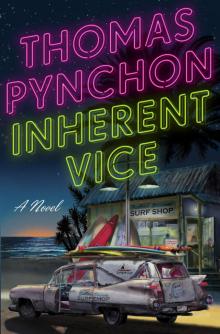 Inherent Vice
Inherent Vice Vineland
Vineland